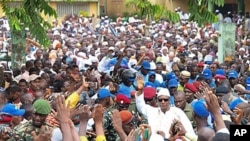As Guinea's first freely-elected president gets to work, hopes are high that his government will tackle the power cuts, lack of running water and rising food prices that continue to make life daily difficult for many Guineans.
The election of Guinea's new president, veteran opposition leader Alpha Conde, on Nov. 7 was billed as the country's first free and fair presidential election since independence and held up as an example for its neighbors.
It marked an end of two years of tenuous, and at times violent, political crisis following a December 2008 military coup and nearly half a century of dictatorial rule.
Speaking at his inauguration in December, Mr. Conde vows to bring Guinea out of poverty and underdevelopment and encourage economic growth and social progress so that Guinea can rejoin the world's emerging nations.
Many Guineans fear the "new era" that Mr. Conde promised is a long way from becoming reality.
Residents of the capital, Conakry, say daily life has grown increasingly difficult since the election, thanks to electricity and water cuts.
In Conakry, residents say prices have risen for basic food staples, such as rice and sugar. The price of locally-grown rice, they say, has doubled to nearly $70 for a 100-kilo bag, since the second round of polling.
"Life after the elections is difficult because all the commodities are high. The prices are high, even rice. We cannot afford it,” one resident said. “Everything is too difficult. It is too much."
The resource-rich country is the world's biggest exporter of bauxite, the raw material in aluminum. Yet, poor governance and political unrest have kept mining revenues from reaching ordinary Guineans, most of whom live on less than $1 a day.
Analysts say the new government faces a monumental to-do list that includes everything from overhauling the country's unruly security forces and healing ethnic divisions to renegotiating mining contracts and winning back billions of dollars in foreign aid.
Aly Fancinadouno, a health worker in the capital, said Guineans must be patient. "The change has started but it is a very long and slow process,” Fancinadouno states. “There is nothing in our Central National Bank. There is nothing as funds. The new authorities, they need funds to start, so Guineans have to be patient."
Three-quarters of Guinea's population live outside the capital, most without access to electricity, running water and basic healthcare.
U.N. Children's Fund representative to Guinea, Julien Morcom-Harneis, says Mr. Conde has inherited a network of vastly under-resourced social services. The health sector, he said, poses the weightiest challenge, at it has not seen significant investment in nearly a decade.
"We have seen worsening maternal and neonatal mortality, which is very unusual particularly for a country which has not gone through a conflict. That more babies are dying and more mothers are dying in childbirth than there was a couple of years ago is a reflection of the decrepit nature of the health infrastructure," Morcom-Harneis said.
He said the majority of health services and staff are concentrated in the capital and rural health centers need more health staff and better access to basic medicines.









